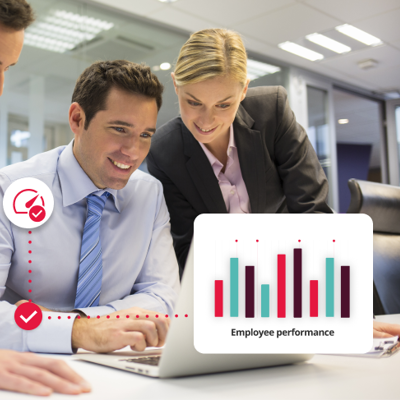Why is performance management important?

What is performance management in business?
Performance management in business is the process of improving the performance of employees and aligning to organisational goals. This can be done with the use of objective setting and the measurement of results through staff appraisals. Many small businesses choose to utilise performance management software, which is often part of a wider HR system, to streamline and automate these processes and ensure a good system is in place.
What is continuous performance management?
Continuous performance management involves ongoing monitoring and feedback throughout the year instead of just using annual appraisals to offer performance evaluations. To ensure employees are consistently meeting expectations and receiving support when needed continuous performance management uses:
- Regular check-ins
- Goal-setting
- Real-time feedback
Businesses should prioritise continuous performance management so they can foster a culture of transparency, accountability, and continuous improvement. Let’s explore the various elements that make performance management important in more detail.
6 reasons performance management is important
Performance management is crucial for businesses of all types and sizes. Below are six reasons why your business should consider the importance of performance management and use it as part of your HR strategy.
1. Improve and reward performance
Performance management allows businesses to monitor and improve employee performance effectively.
Benefits of performance appraisals include:
- Identifying top performers
- Addressing performance issues
- Providing rewards and recognition for outstanding contributions
By tracking performance metrics, businesses can assess the impact of employee performance on organisational goals and make important decisions backed by data.
2. Boost employee motivation and satisfaction
Effective performance management boosts employee motivation and satisfaction by providing:
- Regular feedback
- Recognition
- Opportunities for growth
A supportive work environment fosters a sense of value in employees. This leads to an increase in:
- Engagement
- Productivity
- Commitment
Motivated employees are more likely to stay with the company, so if you get this right, expect to see retention rates improving.
You can read more about the different ways HR software can drive productivity within your workforce in our blog ‘How HR software can improve employee productivity’.
3. Discover the need for training and development
Identifying suitable training and development needs for employees is an important way that performance management can have impact. Regular performance reviews not only help underperforming employees, but they also identify necessary training that can lead to growth such as new departments and services. Businesses can monitor this effortlessly with staff appraisal software.
4. Enhance business communications
Performance management promotes open communication between employees and managers, ensuring that everyone is on the same page. Benefits of performance appraisal include the creation of opportunities for:
- Regular check-ins
- Feedback sessions
- Performance reviews
These sessions help build strong working relationships by facilitating meaningful conversations around which:
- Goals
- Expectations
- Challenges
This kind of communication fosters collaboration, and alignment, leading and leads to trust between employees and managers.
5. Provide important data for recruitment & employee growth
If a business isn’t using performance management, they are missing out on critical data than can inform day-to day operations. By utilising the information found within performance management tools, businesses can discover trends in attrition rate which will help with recruitment going forward. It will also help an employee with mapping out their career plans at the company, and managers can use accurate performance data to ensure employee growth is being met throughout the workforce.
6. Give employees time to speak up
Performance appraisals give employees and managers dedicated time to talk about how the employee is doing in a one-to-one setting. Alongside discussing performance and setting goals, it will offer employees a platform and means that any questions can be addressed, ideas shared, and problems easily dealt with.
Who is responsible for performance management?
While HR professionals often play a central role in performance management, effective systems should involve HR professionals, managers, and employees. HR professionals are responsible for designing and implementing performance management processes, providing training and support to managers, and ensuring compliance with policies and regulations. However, managers and employees also play an active role in setting goals, providing feedback, and driving performance improvement initiatives.
The most effective and successful businesses, regardless of size, will ensure a culture of performance management, appraisals and feedback is embedded throughout all levels of the organisation. This in turn fosters continuous communication, collaboration, and accountability, where managers and employees are engaged in ongoing discussions about performance expectations and areas of development.

What is the impact of poor performance management?
Poor performance management can have serious implications for businesses, including:
- Poor communication between staff: Ineffective performance management can lead to miscommunication, misunderstandings, and conflicts among employees and managers.
- Demotivating goals: Setting unrealistic or demotivating goals can demoralise employees and hinder their performance.
- Unengaged staff: An ongoing lack of feedback, recognition, and support can result in disengaged and unproductive employees who are less committed to achieving organisational goals.

Improve employee performance with software
As we have covered within this article, performance management in business should be prioritised as it helps to enhance business communications, provides invaluable data insights and encourages open communication between employees and managers. There are many benefits of performance appraisal, but it can be difficult to track without the help of software tools.
Businesses that wish to implement or improve their performance management software may want to consider an all-encompassing software such as PeopleHR. Find out more about our services and sign up for a free trial to get started today.

Related resources
We are trusted by experts















































